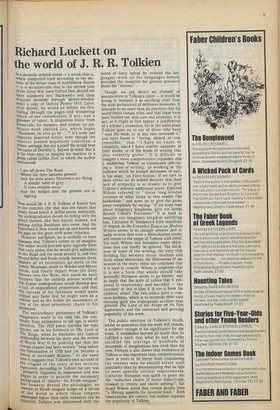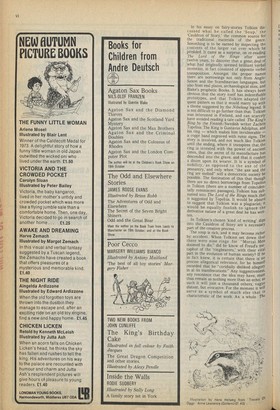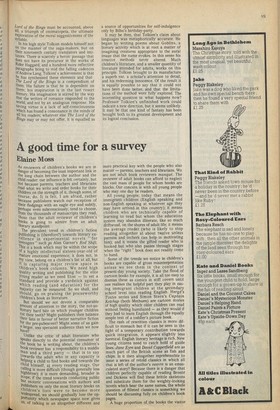Richard Luckett on the world of J. R. R. Tolkien
In a decently ordered world — a world, that is, Which comported itself according to the dictates of the better class of middlebrow fiction — it is inconceivable that in the second year of the Great War some Oxford Don should not 'have wandered into Blackwell's and there acquired (possibly through absent-mindedness) a copy of Oxford Poetry 1915. Later, after dinner, he would sit before his fire, leafing through the pages and wondering Which of the contributors, if any, had a glimmer of talent. A shameless hussy from Somerville, for instance, had written an ambitious work entitled Lay, which began 'Mummers, let love go by ..."! It's scale and dexterity deserved notice, even though the emotion seemed hopelessly contrived: a Writer, perhaps, but not a poet? He would bear the name of Dorothy L. Sayers in mind. But it Is far from easy to imagine his reaction to .a Poem called Goblin Feet, in which the author announced:
I am off down The Road Where the fairy lanterns glowed And the little pretty flittermice are flying.
A slender band of grey It runs creepily away And the hedges and the grasses are a sighing.
How would Mr J. R. R. Tolkien of Exeter fare in the trenches (for that was the future that surely faced him)? A skilful poem, metrically, but undergraduates should be failing with the grand themes, like this Sayers woman, not
Cputting Arthur Rackham into verse. And the 11)!Pothetical Don would get up and knock out his pipe on the grate with some irritation.
However percipient, he is unlikely to have foreseen that Tolkien's career as an imagina tive writer would proceed quite logically from that early poem, that he would give substance to the Road and the lands around it, and that he and Bilbo and Frodo would, between them, explore all its extremities, go north to the Lonely Mountain, south to Mordor and Mount
1?,00m, and finally depart from the Grey Havens into the West. Nor could he have foreseen that the unlikely private world of this Exeter undergraduate would develop into a cult of unparalleled proportions, and that the success of his fantasies would quite eclipse any fame that he might earn as a scholar and as the holder (in succession) of two of the most prominent chairs in his profession. The extraordinary persistence of Tolkien's imaginative world in his own life, the continuity from adolescence to old age, is worth attention. The 1915 poem clarifies the hint !Thrown out in his foreword to The Lord of 'he Rings, when he disclaims any topical relationship between his story and the events of World War II by pointing out that the crucial chapter had been written "long before the foreshadow of 1939 had yet become a threat of inevitable disaster." At the same tiine it suggests that Tolkien's own account of tihe origins of the story is not entirely „ngenuous. According to Tolkien his tale was , Primarily linguistic in inspiration and was oegun in order to provide the necessary lbackground of ' history ' for Elvish tongues." ut however devout the philologist, an Interest in Elvish tongues hangs on a notion of the world in which those tongues developed before their mere existence can be detected. Tolkien was infatuated with the
world of • faery before he evolved the languages; work on the languages simply provided the incentive for greater precision about the history.'
Though we can detect an element of prevarication in Tolkien's claim — it would be wrong to interpret it as anything other than the most perfunctory of defensive measures. It amounts to no more than an assertion that his world obeys certain rules, and that these have been worked out with care and attention. It is not, as it might at first appear, a justification of a scholar's recreation, for in the same place Tolkien goes on to say of those who have "read the book, or at any rate reviewed it,"
and have found it "boring, absurd, or contemptible," that " I have no cause to complain, since I have similar opinions of their works, or of the kinds of writing that they evidently prefer." It is difficult to imagine a more comprehensive rejoinder, and it establishes Tolkien as consciously practising a 'kind of writing,' as working in the tradition which he himself discussed, in part, in his essay on Fairy-Stories.' If we turn to these critics we do indeed discover that their lack of sympathy is so drastic as to give Tolkien's defence additional point. Edmund Wilson referred to "these long-winded volumes of what looks to this reader like balderdash" and went on to give the game away completely by saying: "If we must read about imaginary kingdoms, give me James Branch Cabell's Poictesme." It is hard to imagine any imaginary kingdom satisfying him. Catharine R. Stimpson's little manifesto of disgust, in the Columbia Essays on Modern Writers series, is so cheaply abusive and so badly written that even a disenchanted reader will return to the pages of Tolkien with relief. Yet both Wilson and Stimpson make objections that can hardly be ignored. The slackness of some of the writing, the very thin dividing line between moral idealism and facile moral absolutism, the lifelessness of the women in the story: these are criticisms that it is hard to counter. Wilson is emphatic that it is not a book that adults should take seriously; Stimpson seems to go further, and to imply that the scale of values that it proposes is reactionary and harmful — the 'corollary of this is that it is not a book for children, either. The two critics have a common problem, which is to reconcile their own distaste with the widespread acclaim that greeted The Lord of the Kings on its first appearance, and the continued and growing popularity of the work.
The public reaction to Tolkien's death, whilst no guarantee that his work will endure, is evidence enough of his significance for our times. It establishes beyond all doubt that he fulfilled a need, that what he had to offer satisfied the cravings of hundreds of thousands of imaginations less vivid than his own. Perhaps it also shows that evaluation of Tolkien is less important than comprehension: there is more to be learnt from considering the reasons why he should attain such popularity than by demonstrating that he fails to meet specific critical requirements. Catharine Stimpson was quick to point out the "seductive charm of moral didacticism, cloaked in remote and exotic settings"; Edmund Wilson noted that certain people have "a lifelong appetite for juvenile trash." Both observations are correct, but neither explains the popularity of Tolkien.
In his essay on fairy-stories Tolkien discussed what he called the 'Soup,' the 'Cauldron of Story,' the common source for the traditional materials of the genre. Something is to be earned by inspecting the contents of the larger vat over which he presided. It came as a surprise, on re-reading The Lord of the Rings after some twelve years, to discover that a great deal of
what had originally seemed brilliant verbal invention, in fact consisted of apposite verbal transposition. Amongst the proper names there are borrowings not only from Anglo Saxon and the Scandinavian languages, but also from real places, archaeological sites, and Blake's prophetic Books. It has always been
obvious that the story itself has indentifiable prototypes, and that Tolkien adapted the
quest pattern so that it would marry up with
a theme suggested by the Nibelung legend. It is not difficult to go further than that: Tolkien was interested in Finland, and can scarcely have avoided reading a tale called The King's Ring by the Finnish/Swedish writer Zachris Topelius. The King is Gustavus Adolphus, and his ring — which makes him invulnerable
a coppr band engraved with runic signs. The story is involved, and not much like Tolkien until the ending, where it transpires that the ring is invested with the power of ancient times, that the secret of its manufacture has descended into the grave, and that it confers a doom upon its wearer. It is a symbol of nobility, as opposed to the axe of the
peasantry; and only when "the axe and the ring are melted" will a democratic society be possible. The fascination of this that though
there are no direct borrowings from Topelius
in Tolkien (there are a number of coincidentally reminiscent passages), Tolkien has sub sumed into The Lord of the Rings much that
is suggested by Topelius. It would be absurd to suggest that Tolkien was a plagiarist; it
would be equally foolish to ignore the derivative nature of a great deal he has written.
In Tolkien's chosen 'kind of writing' diPs into the Cauldron of Story are a necessary part of the creative process.
The soup is rich, and it may become richer by accident. When Tolkien set down that there were nine rings for "Mortal Men doomed to die," did he know of Freud's metaphor of the 'ringbearers,' with their vital
part in the evolution of human society? If he
in fact knew, it is certain that there isno precise allegorical relevance, for he himsell, recorded that he "coridially disliked allegory in al its manifestations." Any suggestiveness. any resonance that the idea may have, must thus remain as nothing more than an echo; as such it will join a thousand others; vague, distant, but evocative. For the moment it Wit' serve as a symbol of much else that is characteristic of the work. As a whole The Lord of the Rings must be accounted, above all, a triumph of onomatopeia, the ultimate exploration of the moral suggestiveness of the syllable.
In his high style Tolkien models himself not O n the manner of the saga-makers, but on their nineteenth century translators and imitators. There is scarcely a heroic passage that does not have its precursor in the works of Rider Haggard, and a hundred more reflective Paragraphs bring to mid the falling cadences of Andrew Lang. Tolkien' s achievement is that he has synthesised these elements and that The Lord of the Rings is a compendium of them. His failure is that he is dependent on them; his inspiration is in the last resort literary. His imagination is stirred by the way that the writers of romance responded to the World, and not by an analogous response. His saving virtue is a lack of self-consciousness Which has found a consonance in the minds of all his readers; whatever else The Lord of the ntrigs may or may not offer, it is equalled as
a source of opportunities for self-indulgence only by Bilbo's birthday-party.
It may be then, that Tolkien's claim about languages was metaphorically accurate. He began by writing poems about Goblins, a literary activity which is at root a matter of imagining creatures appropriate to the aural image that the name evokes. In this sense his creative methods never altered. Much children's literature, and a smaller quantity of literature intended for adults, works on this principle. Tolkien brought to its manufacture a superb ear, a scholar's attention to detail, and his redeeming innocence. Of the result it is equally possible to say that it could not have been done better, and that the limitations of the method were fully explored. The interesting question is: what happens now? Professor Tolkien's unfinished work could indicate a new direction, but it seems unlikely. It may be that one kind of fantasy has been brought both to its greatest development and its logical conclusion.




































































 Previous page
Previous page